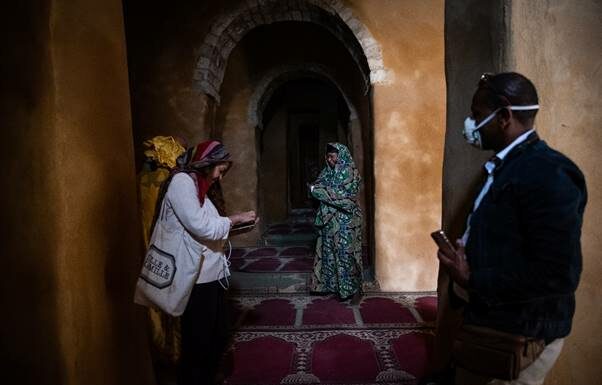Fatou Bensouda, at the conclusion of her visit to Mali
Photo credit: © Timbuktu TFV-ICC HD @Nicolas Réméné
From the 29th to the 31st of March, I had the honour to conduct my third and last official visit to Mali in my capacity as Prosecutor of the International Criminal Court (“ICC” or the ‘’Court’’) before my term ends in June of this year. While in Mali, my delegation and I had a full programme of meetings and productive discussions with the Malian authorities, the judiciary, representatives of civil society, victim associations, community and religious leaders, the academic community and the media. Our exchanges also included meetings with representatives of the United Nations and the diplomatic community based on Mali.
I would like to express my sincere gratitude to the Malian authorities, and the President of the Transition, H.E. Bah N’DAW for the hospitality and cooperation extended to me and my team during my visit to Bamako and Timbuktu.
I would also like to thank the Trust Fund for Victims of the ICC as well as The United Nations Educational, Scientific and Cultural Organization (“UNESCO”) for the organisation and gracious invitation to take part in the historic ceremony marking the symbolic recognition of victims – their suffering, their courage and resilience – following the conviction of Mr Ahmad Al Faqi Al Mahdi, the first individual accused and convicted at the ICC for the war crime of intentionally directing attacks against religious and historic buildings in Timbuktu, Mali. Mr Al Mahdi was sentenced to nine years imprisonment and ordered to pay 2.7 million euros in reparations to victims. His conviction sent a clear message that these are serious under international law and that perpetrators must be and will be held accountable. Cultural heritage must no longer be attacked and destroyed with impunity.
As I stated at the ceremony, when cultural property is destroyed, it erases the past, never to be lived again, leading to an irreplaceable loss to humanity. We must pool our resources and within our respective mandates, collectively address the serious issue of the destruction of cultural heritage in war and conflict. No actor alone is able to effectively fight impunity for atrocity crimes and protect cultural heritage. Joint action and collaboration are essential. We must indeed #unite4heritage.

Given the importance that I, along with my Office, attach to this matter, and in line with my Strategic Plan to pay particular attention to crimes against and affecting cultural heritage, we recently published a Draft Policy on Cultural Heritage for consultation and comments by States Parties to the Rome Statute, civil society and other stakeholders. My Office has enjoyed close collaboration with UNESCO on this initiative, and I seize the opportunity to publicly salute them for their critical work and the cooperation and assistance extended to my Office. We look forward to our continued collaboration.
In our second case in the Situation of Mali, the trial against Mr Al Hassan Ag Abdoul Aziz Ag Mohamed Ag Mahmoud has been ongoing since last July. Mr Al Hassan faces a total of 13 charges of crimes against humanity and war crimes, including sexual and gender-based crimes and the deliberate attacks against cultural heritage allegedly committed in Timbuktu. He is the first individual at the ICC to be charged with persecution on the grounds of gender and on religious grounds. The attack on cultural heritage is part of the underlying crimes.
My Office will continue to do what it can to address these serious crimes, including the assault on cultural heritage – our common heritage. My personal visit to Timbuktu on this occasion and having directly interacted with community leaders and those affected by the destruction brought upon this historic city have only reinforced my belief in the importance of accountability for such crimes. History, whose physical embodiment is at peril through such attacks, will not be generous to our failure to care or act decisively.
During my visit, I have also discussed with the Malian authorities the ongoing violence in the country, and in particular, the preoccupying situation in central Mali and the need to ensure that investigations by the Malian authorities are conducted as swiftly as possible and that those responsible for the commission of atrocities against the civilian population are brought to justice. I reiterated the commitment of my Office to provide support as appropriate in conformity with our mandate and the principle of complementarity to assist national efforts to investigate and hold accountable those responsible for atrocities.
Our investigations in Mali continue. I am grateful to the Malian authorities for their cooperation and support. My Office remains committed to doing everything it can within its mandate and means to advance justice for victims of atrocity crimes, whether at the ICC or in support of national efforts within the framework of complementarity.



